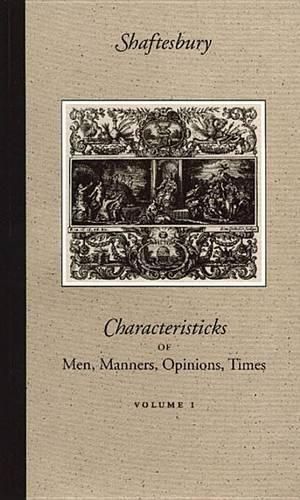Readings Newsletter
Become a Readings Member to make your shopping experience even easier.
Sign in or sign up for free!
You’re not far away from qualifying for FREE standard shipping within Australia
You’ve qualified for FREE standard shipping within Australia
The cart is loading…






This edition of Charactersticks presents the complete 1732 text of this classic work of philosophy and political theory. Also included are faithful reproductions of the engravings that Shaftesbury created to facilitate the reader’s consideration of his meditations on the interrelationships among truth, goodness, beauty, virtue, liberty, responsibility, society, and the state. The grandson of a founder and leader of the English Whigs, and tutored by John Locke, Anthony Ashley Cooper, the Third Earl of Shaftesbury (1671-1713) wrote this three-volume text, which was originally published in 1711. It was revised in 1714 to accommodate the illustrations by Shaftesbury. Widely regarded as the first exponent of the view that ethics derives, not from reason alone, but from sentiment , Shaftesbury criticizes not only Locke but especially Hobbes for the dim view that the state of nature is a war of all against all . To the contrary, Shaftesbury argued that human nature responds most fully to representations of the good, the true and the beautiful, and that human beings naturally desire society. In all of these reflections, he provides a large scope for the exercise of individual liberty and responsibility.
$9.00 standard shipping within Australia
FREE standard shipping within Australia for orders over $100.00
Express & International shipping calculated at checkout
This edition of Charactersticks presents the complete 1732 text of this classic work of philosophy and political theory. Also included are faithful reproductions of the engravings that Shaftesbury created to facilitate the reader’s consideration of his meditations on the interrelationships among truth, goodness, beauty, virtue, liberty, responsibility, society, and the state. The grandson of a founder and leader of the English Whigs, and tutored by John Locke, Anthony Ashley Cooper, the Third Earl of Shaftesbury (1671-1713) wrote this three-volume text, which was originally published in 1711. It was revised in 1714 to accommodate the illustrations by Shaftesbury. Widely regarded as the first exponent of the view that ethics derives, not from reason alone, but from sentiment , Shaftesbury criticizes not only Locke but especially Hobbes for the dim view that the state of nature is a war of all against all . To the contrary, Shaftesbury argued that human nature responds most fully to representations of the good, the true and the beautiful, and that human beings naturally desire society. In all of these reflections, he provides a large scope for the exercise of individual liberty and responsibility.